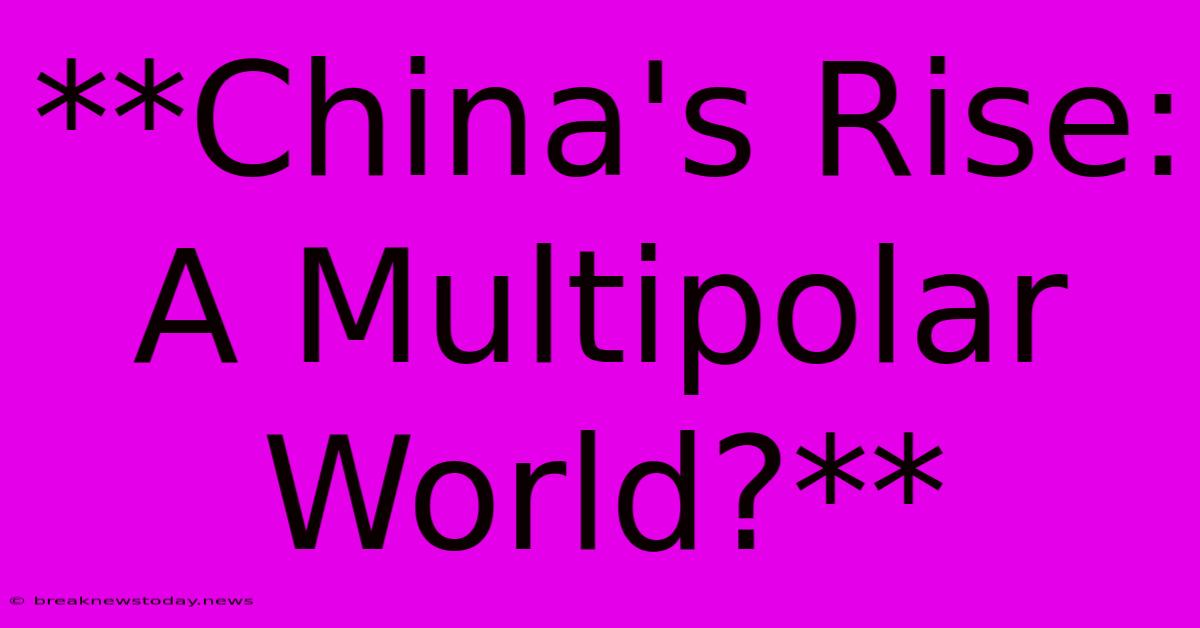**China's Rise: A Multipolar World?**

Discover more detailed and exciting information on our website. Click the link below to start your adventure: Visit Best Website naughtynakes.com. Don't miss out!
Table of Contents
China's Rise: A Multipolar World?
The rise of China is one of the most significant geopolitical developments of the 21st century. Its economic growth has been phenomenal, propelling it to become the world's second-largest economy and a major player in global trade and finance. This rapid ascent has led to widespread speculation about the future of the international order, with many pondering whether China's rise will lead to a multipolar world.
A Changing Global Landscape
For decades, the world has been dominated by a unipolar order, with the United States holding the reins of power. However, China's rise has challenged this dominance, shifting the balance of power and creating a new era of uncertainty.
Here's how China's rise is shaping the global landscape:
- Economic Power: China's booming economy has made it a major trading partner for countries worldwide. Its Belt and Road Initiative (BRI) is investing heavily in infrastructure projects across Asia, Africa, and Europe, increasing its economic influence and presence.
- Military Strength: China has been steadily modernizing its military, investing in advanced weaponry and expanding its naval capabilities. It is increasingly assertive in the South China Sea and beyond, raising concerns about its intentions and potential for conflict.
- Technological Advancements: China is rapidly innovating in areas like artificial intelligence, 5G technology, and renewable energy, challenging the United States' technological dominance and reshaping the global innovation landscape.
- Global Influence: China is actively engaging with developing countries, providing them with aid and investment, building alliances, and expanding its diplomatic influence. This has led to a decline in the United States' traditional dominance in these regions.
The Multipolar World Debate
The question of whether China's rise will lead to a multipolar world is a complex one, with diverse perspectives.
Arguments for a Multipolar World:
- Power Shift: The shift in economic and military power towards China suggests a multipolar world where no single nation holds absolute dominance.
- Regional Powers: The rise of regional powers like India, Indonesia, and Brazil, alongside China, further indicates a decentralized global order.
- Increased Competition: Competition between the United States and China in areas like technology, trade, and influence suggests a multipolar world where cooperation and conflict coexist.
Arguments against a Multipolar World:
- US Dominance: Despite China's rise, the United States still retains significant military and economic power, suggesting its continued dominance.
- Western Alliance: The Western alliance, led by the United States, remains a powerful force, capable of balancing China's influence.
- Challenges to China's Rise: Internal challenges like economic inequality and environmental degradation could hinder China's rise and its ability to reshape the world order.
The Future of the International Order
Whether the world transitions to a multipolar order or remains under the influence of the United States is a question that only time will answer. However, one thing is clear: China's rise is fundamentally altering the global landscape.
The future will likely be characterized by a more complex and dynamic world, with greater competition and cooperation between nations. Understanding the implications of China's rise and its impact on the international order is crucial for navigating the challenges and opportunities of the 21st century.
The world is entering an era of unprecedented change, and China's role will be a defining factor in shaping the future global order.

Thank you for visiting our website wich cover about **China's Rise: A Multipolar World?**. We hope the information provided has been useful to you. Feel free to contact us if you have any questions or need further assistance. See you next time and dont miss to bookmark.
Featured Posts
-
Kudelski Aktie Anleger Verkaufen Kurs Sinkt
Nov 02, 2024
-
Islanders Vs Sabres Game Preview Watch Info
Nov 02, 2024
-
We Re Back Line Of Duty Hints At New Season
Nov 02, 2024
-
Succe Foer Gyoekeres Fyra Mal Beroem
Nov 02, 2024
-
San Lorenzo Espectacular Gol De Larga Distancia
Nov 02, 2024
